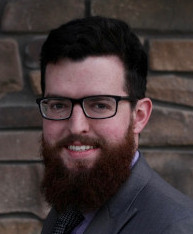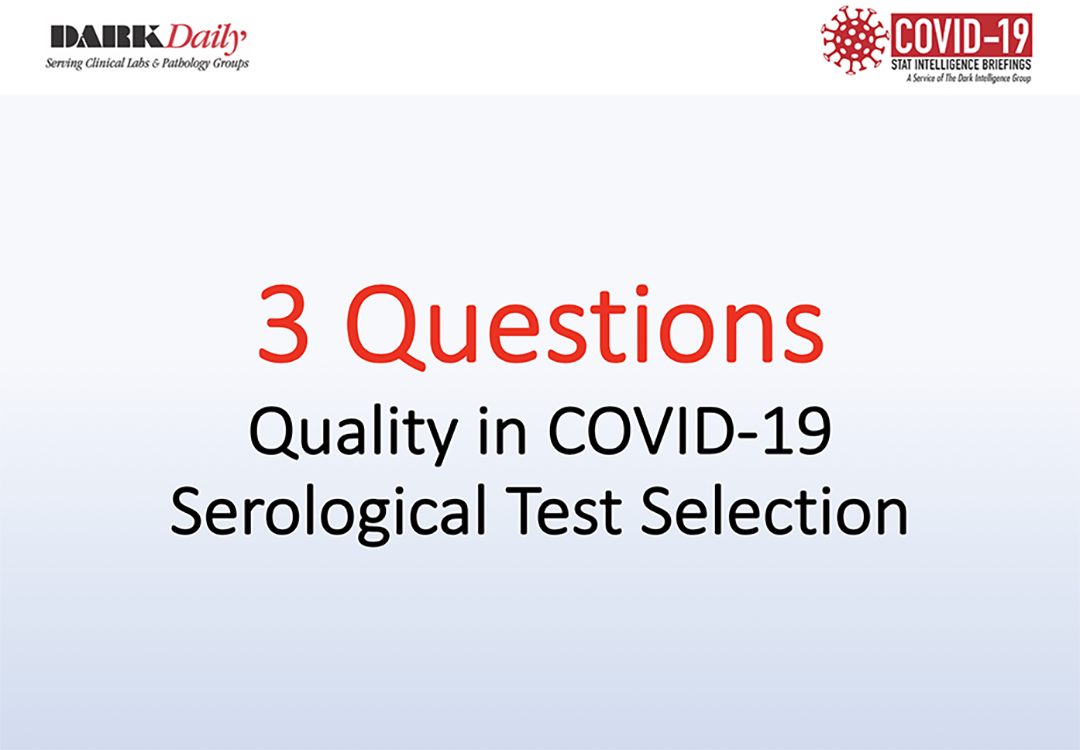Topics include adopting a platform that already has an FDA EUA, validating rapid test kits for use at remote sites, and other coronavirus antibody cross-reactivity.
COVID-19 serology testing puts a new twist on long-established clinical laboratory processes and puts the lab at risk in new ways.
To assist laboratory teams in their serology test quality efforts, James O. Westgard, PhD, and Sten Westgard, the principals of Westgard QC, presented part one of a two-part webinar program that explored multiple aspects of serology tests available, explaining how clinical laboratories can decide on which test is best for a lab’s specific situation. The following has been adapted from the May 21, 2020, “Quality Issues Your Clinical Laboratory Should Know Before You Buy or Select COVID-19 Serology Tests,” hosted by the COVID-19 STAT Intelligence Briefings Service and Dark Daily.
Question 1: Are there specific clinical agreement sensitivity and specificity requirements that have to be demonstrated by the lab that is adopting a platform that already has an FDA Emergency Use Authorization?

James O. Westgard, PhD: What we have are some pretty strong guidelines from the FDA: 90% sensitivity and 95% specificity. It is been unusual that they really come out and say that this is what you should be achieving in terms of sensitivity and specificity, but I would take those as pretty basic requirements at this point.
Question 2: We have a rapid test kit that had applied for FDA EUA approval, but it had not been granted yet. We’re trying to validate these rapid kits to be able to use those at remote sites. I’m confused what validation studies need to be performed within the laboratory that performs the assay versus using the studies that the rapid kit provides.
James O. Westgard, PhD: The guidelines for the laboratory studies are not very clear at this point. With the introduction of these new methods, the FDA has been pretty lax which then has also meant that the requirements for laboratories are pretty lax. Some of that was because of the availability—or lack of availability—of the patient samples that were from patients who had been diagnosed with the disease. All of this is changing very quickly, so one guideline I’ve seen is that laboratories should test a minimum of 10 positives and 10 negatives to validate a test. That’s a published guideline; I asked the people where they got the numbers they basically said that this is a minimum based on the costs and available samples and whatnot. Another way to look at it is how many patients do you need to get a reliable estimate of sensitivity and specificity. In my mind the minimum number there is about 20. FDA is saying 30 positives, 75 negatives for manufacturers. CLSI has a guideline for validation of qualitative tests, and they say 50 positives and 50 negatives. So there is no firm guidance at this point. The more tests that you do the better your numbers, the more reliable the figures, so my thought at this point is I’d want at least 20. Twenty positives, 20 negatives. The negatives are not so much of a problem if you’ve got access to old specimens. It’s more what’s the cost of doing the study.
Question 3: Other coronavirus antibody cross-reactivity—what is known?
James O. Westgard, PhD: They expect particularly in the older population that the older people will have antibodies to virtually all previous coronavirus so this is why if you test old samples from before December of last year, those samples are a good check on cross reactivity.
With attention turning to confidence and reproducibility in accurately detecting SARS-CoV-2 antibodies through serological testing, a follow-up webinar will be held Thursday, June 11 at 1 p.m., Eastern. Registration details can be found here. Technical goals for the follow-up webinar will touch on essential elements of validation and quality, but applied to the unprecedented challenges laboratory teams will face as they work with a new COVID-19 serology test that may have limited data available.

—By Caleb Williams, Editor, COVID-19 STAT
Related Resources:
Westgard QC May 21 Webinar Points of Interest
Register for June 11 Westgard Webinar: Achieving Confidence in Serology Testing






